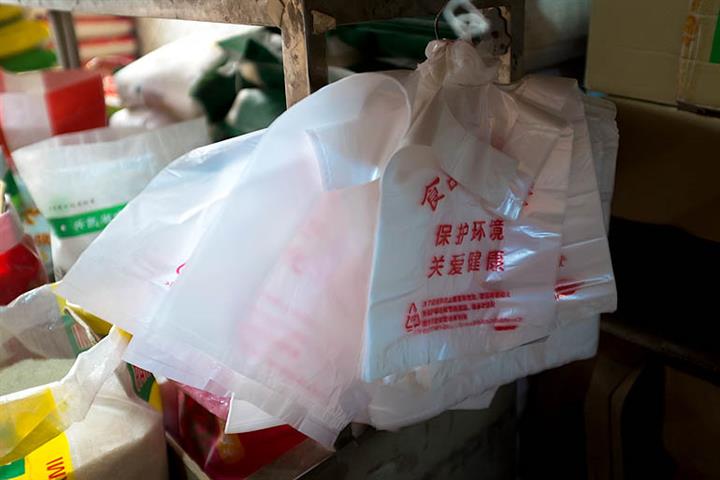 Shanghai's Stores, Food Joints Switch to Pricier Green Packaging Amid Plastics Ban
Shanghai's Stores, Food Joints Switch to Pricier Green Packaging Amid Plastics Ban(Yicai Global) Jan. 7 -- Shanghai's food and beverage venues are gradually replacing their plastic utensils and packaging with more eco-friendly options amid the city's new ban on single-use disposable plastics despite the rising costs.
Many supermarkets, retail stores, milk tea shops, and restaurants in Shanghai have stopped using non-biodegradable plastic bags and utensils, Yicai Global discovered by visiting these venues.
As 2021 started, Shanghai outlawed the manufacture, sale and use of single-use, non-degradable plastics in its catering, hospitality and e-commerce sectors. Over 20 provinces, including Guangdong, Hainan, and Shaanxi, have also brought in plastic restrictions, inspired by the central government's intent on reducing plastic waste.
Shop owners have taken heed of the new rules. An employee at a Century Mart Supermarket in Shanghai told Yicai Global that customers can buy a biodegradable shopping bag or bring their own.
A Little Tea has replaced all its straws with biodegradable ones since Jan. 1, said a worker at the milk tea store.
Hefu Noodle has started using cornstarch tableware and nonwoven textile bags for takeout, the noodle shop's workers told the same news outlet.
The plastics ban has raised the market demand for substitutes, the chief of Sizhuo Plastic Industry told Yicai Global. The former maker of plastic straws in Ningbo has secured orders for paper and biodegradable plastic straws to be delivered in April and May.
But prices of substitutes are double or triple that of their predecessors, said the chief, surnamed Xia. A ton of plastic straws costs as little as CNY15,000 (USD2,323). A similar quantity of paper ones costs around CNY30,000 and the price of biodegradable plastic straws is CNY50,000, he said.
The more environmentally friendly straws cost about 30 percent or 40 percent more than plastics ones, Chen Shi, head of public relations at Nayuki Tea & Bakery told Yicai Global. Other interviewed retail professionals presented similar price estimations.
But not all of Shanghai's retail stores have gone fully green yet. A milk tea store on the city’s Gumei Road is still using a mix of plastic and biodegradable straws. "We haven’t received enough new straws," said an employee. "We are expected to stop using plastic straws after the Spring Festival.”
Moreover, the emerging sector still has ways to go for better user experience. Many netizens have pointed out paper straws' flaws on social media platforms. Burger King China also got some first-hand experience on the matter. The fast-food chain first tested out paper straws but changed to the more expensive biodegradable plastic ones after noticing that paper softens quickly in carbonated drinks, Chief Executive Zhu Fuqiang said in a media interview.
Editor: Emmi Laine